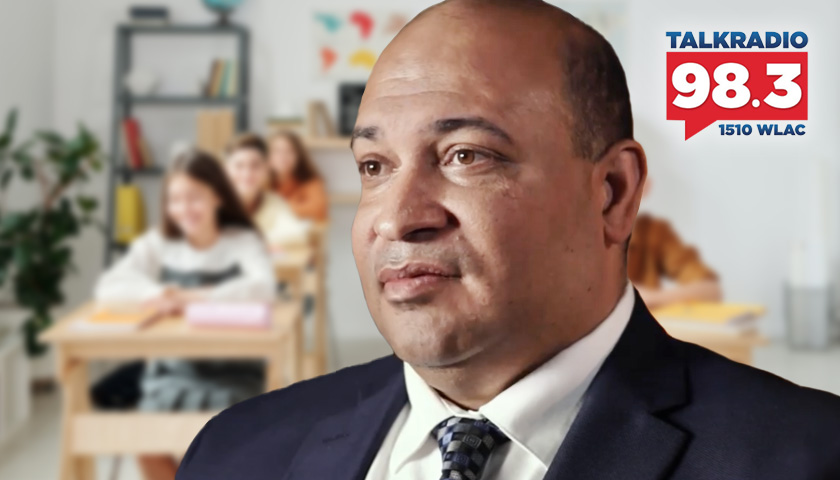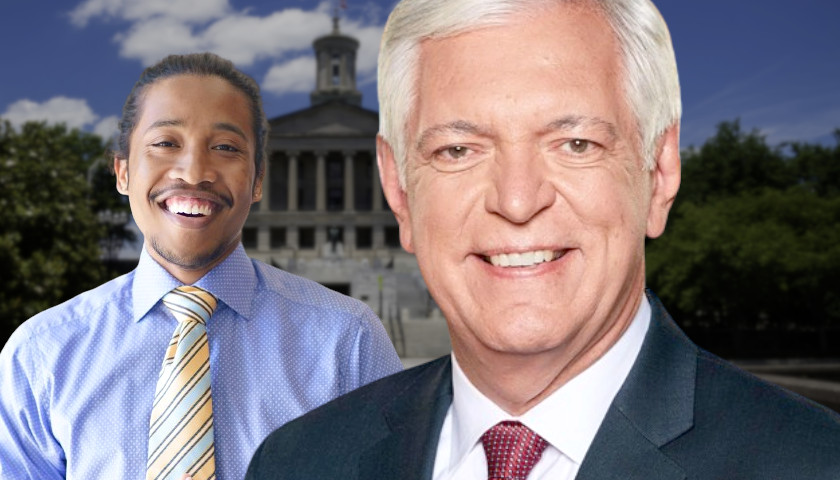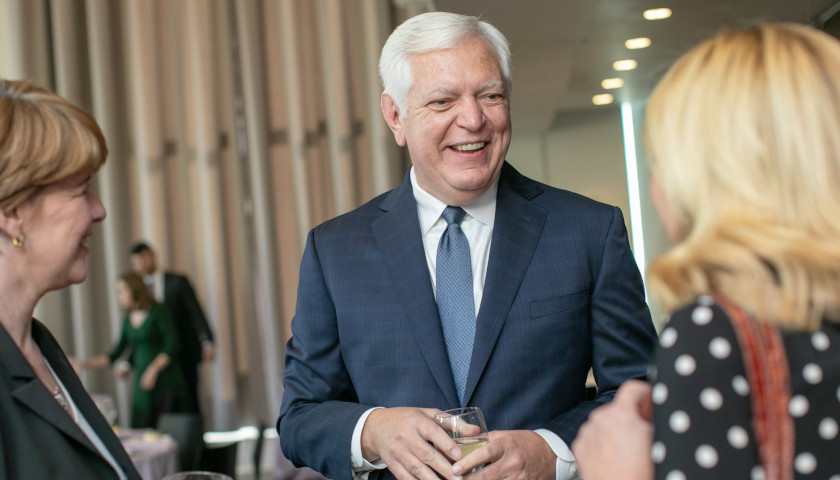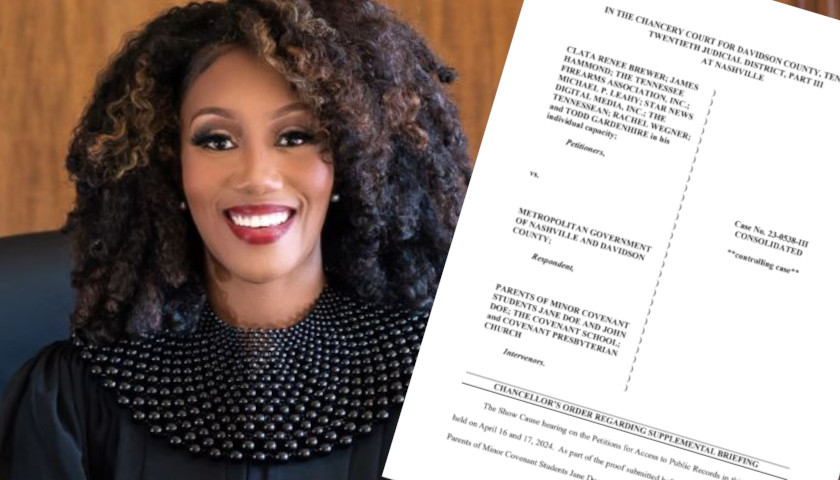Live from Music Row Tuesday morning on The Tennessee Star Report with Michael Patrick Leahy – broadcast on Nashville’s Talk Radio 98.3 and 1510 WLAC weekdays from 5:00 a.m. to 8:00 a.m. – host Leahy welcomed Principal Phil Schwenk in-studio to talk about what motivates him to teach, and the difference between a regular public charter school and a classical public charter school.
Leahy: We’ve been having a great conversation here with Phil Schwenk, principal with American Classical Academy. It is a top-rated public charter school, you’re affiliated with Hillsdale College.
Phil, let me introduce you to our very good friend, the official guest host of The Tennessee Star Report, formerly our lead political reporter, stolen away (laughs) by the Faith and Freedom Coalition to be the state director, Mr. Aaron Gulbransen. Good morning, Aaron.
Gulbransen: Good morning to both of you.
Schwenk: Good morning.
Leahy: The programming note here is that, Aaron, on election night, five weeks from today, November the 8th, we will hold a special edition of The Tennessee Star Report from 7:00 p.m. until 10:00 p.m.. And it will be election reporting and analysis.
And all of our all-star panelists, Crom Carmichael, Roger Simon, Clint Brewer, and of course, Aaron Gulbransen, are invited to participate in that. And so if you’re available, Aaron, we’d be delighted to have you in the studio.
Gulbransen: This is what they call in the business putting one on the spot. (Leahy laughs) Of course, I will be there for that.
Leahy: A little story. In 2020, we did the same thing on election night, and we did it from 7:00 p.m. until midnight. And then I came back at 5:00 the following morning, because it was election night.
Gulbransen: A tale of two elections.
Leahy: Yes, but when we left at 11:45, we had five all-star panelists. I did a survey and I said, what’s the probability that Donald Trump has won re-election? And the consensus was between 85 and 90 percent. That was at midnight on election night.
I got back in at 5:00 in the morning and I looked at the hundreds of thousands of votes that had come in miraculously overnight in Wisconsin and Pennsylvania for Joe Biden, and it was very clear that something was going on. And that was a very memorable evening, and 24-hour period.
Gulbransen: I had a similar experience producing a special edition of Jay Sekulow Live in 2020. And we all went to bed around 12:30 or so. Coincidentally, my back had gone out that day and I was in the worst pain of my life. That should have been a clue of what was to come.
Leahy: The country has been in for two years, in the worst pain of its history. So we’ll have that on five weeks from today, and look forward to having you here, Aaron. We might talk to the program people.
I don’t know if we want to extend it to midnight or just kind of go through to 5:00 a.m., so we check and see if anything crazy happens, but 7:00 p.m. to 10:00 p.m. for sure. Let’s go back to our friend Phil Schwenk. Phil, there you are in your career.
You’re now a history teacher and a basketball coach in Los Angeles Public Schools. You do that for 16 years. What’s the big takeaway from teaching public school in Los Angeles for 16 years?
Schwenk: I think I mentioned this last time, the kids are awesome. I can’t say it enough. L.A. is such a large city, so I got to see, like, every kid, especially the international populations, all over. It’s the systems, it’s a big system.
Leahy: So the kids are awesome.
Schwenk: Always.
Leahy: Okay, so now you have done something very important.
Schwenk: What’s that?
Leahy: You have given us hope. Because you look at this from afar and you see what’s happening and you say, oh, my gosh, is this generation even salvageable? It sounds to me like you would say, absolutely, the kids are awesome.
Schwenk: In fact, if I did believe that, I would say I need to step out of education. If you become hopeless, which is part of the problem …
Leahy: I think a lot of people in public K-12 education are hopeless at this time.
Schwenk: I 100-percent agree. And they should step out of education. But kids, that’s the nice thing about kids. Kids allow us as a society to kind of reset.
If you don’t have hope that they can be taught and nurtured and made into these good human beings that continue this great experiment that we have, then, frankly …
Leahy: So, people now listening to the program as they’re driving in, are saying, oh, all right, maybe there’s some hope. When you were in LA. you became involved in public charter schools. How did that happen?
Schwenk: I’d been in LUSD, Los Angeles Unified School District, for six years, and I had a friend who had a friend that was starting a charter school. And so she called me up and said, hey, I have a friend that’s starting a charter school.
They need somebody who leads the ed part of it. Are you interested? I said sure. So that turned into a conversation where I was hired as the lead teacher.
I got to hire all the teachers for that school and train them in the curriculum and set that up. And that was kind of the transition from the large, one million students of LUSD to, we started, I think, with 113 to 200 kids.
Leahy: It was a public charter school, but it didn’t use the classical curriculum?
Schwenk: No, this was kind of what we’d call on the other side of the fence, kind of progressive education.
Leahy: From there you were recruited to go back to Cleveland?
Schwenk: Actually, I was there for three years there, and then I was part of two other charter schools, and then I was recruited to Cleveland.
Leahy: And you went back to a public school system, a non-charter school.
Schwenk: Cleveland Metropolitan School District, which would be like an LUSD.
Leahy: And so you did that as a principal for a period of time?
Schwenk: For seven years.
Leahy: Then you get recruited to do Hillsdale-affiliated public charter classical school. And what’s the difference between a public charter school that’s not classical and a public charter school that is classical?
Schwenk: That list is long, to summarize it.
Leahy: Well, we have five minutes. (Laughs)
Schwenk: I think the primary ways to look are the orientation. It’s the orientation of the student to the teacher, and the orientation to what the students are being asked to learn about.
So the easiest way to look at the teacher is, increasingly in public education, we’ve moved the teacher to what we call the guide on the side. It’s all about the kids. The kids that kind of decide what they’d like to learn about, what’s most relevant to them. And the teacher kind of guides them in that.
I would say classical moves back to what most of the education has been, where it’s the sage and the stage. It’s somebody who has a significant understanding of things and is worthy of paying attention to and they lead the class.
And what do they lead in? They lead in two major areas. One is intellectual growth, making sure that these kids are learned, an understanding of how to read, write, mathematics, reason, those types of things.
But I would say just as important is that these kids need to be virtuous and good human beings, and that they model the behaviors we’d expect of our kids. And all the classical schools have a group of virtues that they focus on.
Listen to today’s show highlights, including this interview:
– – –
Tune in weekdays from 5:00 – 8:00 a.m. to The Tennessee Star Report with Michael Patrick Leahy on Talk Radio 98.3 FM WLAC 1510. Listen online at iHeart Radio.
Photo “Phil Schwenk” by Northwest Ohio Classical Academy. Background Photo “Students in Class” by Max Fischer.








